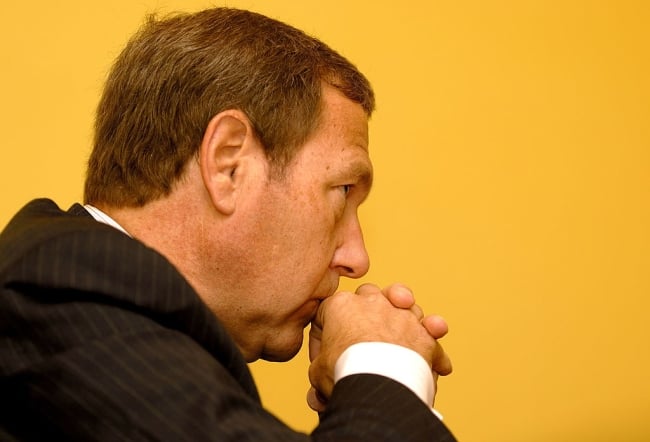You have /5 articles left.
Sign up for a free account or log in.

University of Iowa president Bruce Harreld has announced retirement plans.
The India Today Group/Contributor via Getty Images
University of Iowa president Bruce Harreld will retire early, likely two years before his contract expires in 2023, he announced Thursday.
His retirement follows a controversial five-year presidency and a campus COVID-19 outbreak that sickened thousands of students, faculty members and staff members.
Harreld formally informed the Iowa Board of Regents of his plans Sept. 22 in a letter to the board's president, Mike Richards. In the letter, he promised to stay on until a new president is in place or until the board asks him to leave. He did not provide a reason for his early retirement in the letter or in a later message to students, faculty and staff members.
“On a personal note, the past five years -- while certainly challenging -- have reaffirmed my conviction that public higher education is a critical component of our democratic society,” Harreld wrote in his letter to campus groups. “Yet, institutions like ours are critically underfunded and continue to dramatically drop in independent rankings. To put it simply, they are a public good and we must elect leaders who will protect and invest in public higher education just as our predecessors did.”
The board will meet Monday to formally accept Harreld's retirement and begin a search process for a new president. Harreld’s early retirement did not stem from pressure or incentives by the board, said Josh Lehman, a board spokesperson.
Harreld’s presidency started on a sour note. When he was appointed to the role in 2015, faculty members expressed concern about his lack of higher education experience. The former IBM senior vice president had served as an adjunct business professor at Harvard University and Northwestern University for eight years.
If animosity lingers between Harreld and faculty members, it’s not something the university's Faculty Senate is discussing publicly. Joseph Yockey, president of the Faculty Senate, and Teresa Marshall, its vice president, said they appreciate his service to the university.
“We suspect faculty are surprised by the timing of the announcement, but we appreciate that President Harreld is not retiring immediately so that the University and Board of Regents [have] ample opportunity to search for his replacement,” they said in an email. “We appreciate this careful consideration of succession planning, especially during our current COVID-19 pandemic.”
Harreld's initial rocky reception at the university drew attention across the country.
“His has been a particularly stressful presidency,” said James Finkelstein, professor emeritus of public policy at George Mason University, who studies college presidents' compensation. “It started out very badly. And based on reporting I’ve read, even though he was there a fair amount of time, it doesn’t sound like he became the darling of the faculty.”
Harreld declined to comment for this article.
Frustrations with Harreld’s leadership swelled during the pandemic. Recently, some students, faculty and staff members staged a sick-out to protest the university’s reopening plan and insist that in-person instruction be canceled during the pandemic. The university reopened with a hybrid in-person-online instruction model in mid-August. In early September, Iowa City, where the university is located, emerged as a coronavirus hot spot.
As of Sept. 28, nearly 2,000 students and 45 employees have self-reported that they tested positive for COVID-19. The university is only tracking self-reported cases.
Questions are swirling about Harreld’s compensation plan and potential exit package. When Harreld extended his contract last year, the board tacked on an additional $1.33 million in deferred compensation, bringing the total deferred compensation to $2.33 million, reported The Gazette of Cedar Rapids.
Harreld will receive the deferred compensation only if he is continuously employed through June 30, 2023, Lehman, the board's spokesperson, said in an email.
It’s possible that Harreld could stay on at the university as a business professor -- the option was provided in his original appointment letter. It’s unusual for deferred compensation to be tied to general employment rather than the presidential position, but it’s possible, said Finkelstein.
“With your appointment of President and subject to the recommendation of the faculty you will be granted tenure as a Professor in the College of Business,” Harreld’s appointment letter reads. “Upon your retirement or resignation from the position of President, you may continue your appointment as a tenured professor in the College of Business. You will receive a salary commensurate with the highest paid tenured professor in the College of Business, along with the usual fringe benefits accorded to all faculty at the University of Iowa.”
Harreld said publicly in 2015 that he would not demand a tenured position as a condition of his employment. It’s unclear if he will seek a professor position now or continue his employment at the university in some other way.




